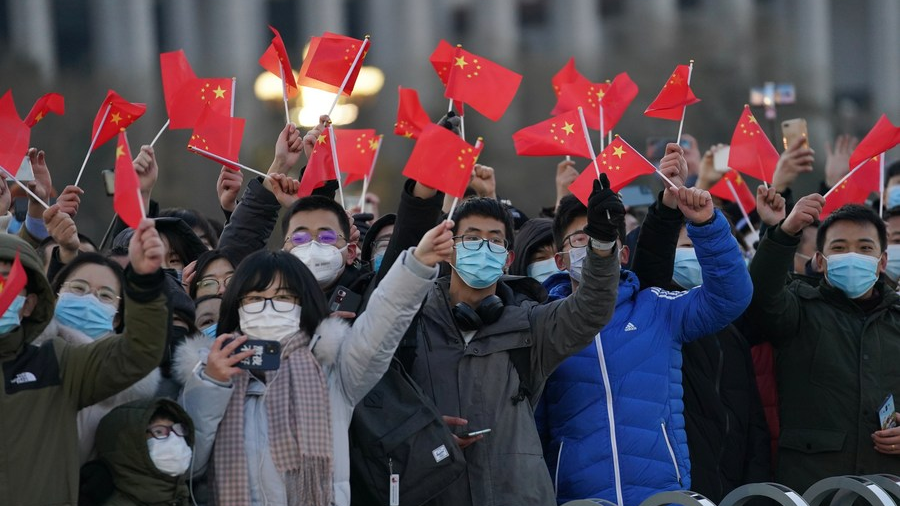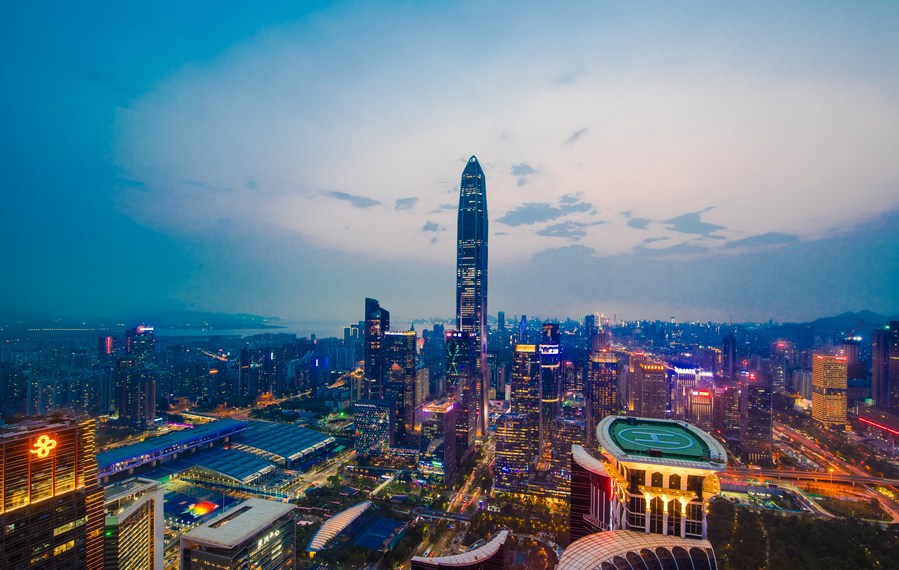
People wave Chinese national flags after a grand national flag-raising ceremony at the Tiananmen Square in Beijing, capital of China, January 1, 2021. /Xinhua
People wave Chinese national flags after a grand national flag-raising ceremony at the Tiananmen Square in Beijing, capital of China, January 1, 2021. /Xinhua
Editor's note: Fan Peng is a research fellow and the director of the Research Office of Contemporary Chinese Politics at the Institute of Political Science of the Chinese Academy of Social Sciences. This is the fourth piece of our "China's view of democracy" series. The article reflects the author's opinions and not necessarily the views of CGTN.
That people are a country's foundation is a philosophy enshrined in China's politics from ancient times. The people are the true heroes who create history. And they are the fundamental force that determines a country's future and its destiny. In China, people's status as masters of the country is the essence of democracy. People-centered philosophy is the most distinctive political tenet of Chinese democracy.
Upholding the notion and principle that development is reliant on the people, for the people, and that its fruits should be shared by the people, the Chinese government tries to reflect the will of the people, safeguard the interests of the people, listen to the voices of the people and gather the strength of the people in pushing for the country's modernization and development. In addition to the right to vote stipulated by law, people also have a full range of democratic rights in decision-making, governance and supervision, which is a manifestation of the country's commitments to broad and multi-level democratic rights.
The system of People's Congresses best exemplifies people's status as masters
In essence, the system of people's congresses is to guarantee that all power of the state belongs to the people. People participate in the management of state affairs and exercise their right through the system of people's congresses. As of April 2021, more than 2.62 million deputies serving as deputies to the people's congresses nationwide at all levels. These deputies come from different ethnic groups, professions, social groups and parties. And they represent a very broad swathe of the society. In the 13th National People's Congress (NPC), workers and farmers accounted for 15.7 percent of all the deputies. In order to ensure that the state power is truly in the hands of all the people, the deputies must reflect and represent the interests and will of the people when performing their duties.
The system of people's congresses provides a fundamental political guarantee for people's mastery of the country, and it is also the main channel through which people practice democracy. All major legislative decisions in China are produced through democratic deliberation as well as science-based and democratic decision-making in accordance with proper procedures. At each step of the legislative process, opinions from all sides are consulted. In January 2021, seven draft laws were published on the website of the NPC to solicit public opinions. Open-door legislation by the NPC has not only sparked the public's growing enthusiasm in participation, it also enables voices from the grassroots level to reach the national legislature directly. During the codification of the Civil Code, 10 public consultations were held, and more than 1.02 million pieces of opinions were collected from around 425,000 people, building social consensus on legislation to its maximum extent.
People's participation is fundamental to people's mastery of the country
To determine people's democratic rights, besides their right to vote in elections, their constant participation in daily political life and their right to take part in the democratic decision-making process, in governance and supervision are also important. If people only have the right to vote but no right to participate extensively in other activities, or if the people's right is only activated for voting while checked soon after, such democracy is formalistic.

The view of the Central Business District in Shenzhen, south China's Guangdong Province. /Xinhua
The view of the Central Business District in Shenzhen, south China's Guangdong Province. /Xinhua
It is an important way of governing for the Communist Party of China (CPC) to apply medium- and long-term planning in guiding socio-economic development. In preparation for the 14th Five-Year Plan, the central government solicit advice and opinions from all walks of life to better combine top level design and public consultation from grassroots. The online platform received more than one million messages from the public, from which the government drew upon more than 1,000 suggestions. The vast majority of local governments and their functional departments have also set up online and offline communication channels, such as a "leadership mailbox" and "public service hotline," to solicit public opinions on local legislative drafts and major decisions. In some places, "public hearing" is held on a regular basis, so that opinions and suggestions from all walks of life and voices from the grassroots level can reach relevant government departments directly.
Besides state governance, through diverse democratic governance mechanisms, people in China also participate in governance at the local level, such as village (residential) committees, enterprises, public service institutions, civil service agencies, and social organizations. When the COVID-19 pandemic broke out, prevention and control measures taken by the self-governance organizations at the community level were highly complementary to the government's proactive, flexible and decisive response measures. Governance at the community level serves local residents in the last mile and plays a significant role in building the social governance system in China.
Seeking for the greatest common denominator is at the heart of people's democracy
The true meaning of people's democracy is to build agreement among the largest number of population. The Chinese people have a strong belief in consultation, and to have people's matters widely consulted is the democratic value that people hold every day without realizing. To practice people-centered democracy and to ensure that people are the masters of their own country, it is required to carry out extensive consultations among the people with regard to all aspects of governance. China believes in the value of consultation: the more consultation conducted, the better, so as to promote the development of a wide-ranging, multi-layered and institutionalized socialist consultative democracy.
The multi-party cooperation and political consultation system under the leadership of the CPC has led to the organic unity of democratic governance and participation in politics, leadership and cooperation, consultation and supervision. It's a testament to the fundamental value of socialist democracy to "consult widely." In the current practice of consultative democracy by the Chinese People's Political Consultative Conference (CPPCC), thematic consultation sessions focusing on economic development, people's livelihood, social issues, environmental protection, education, healthcare, culture, and other special issues related to the governance of the country have been generally accepted, and have become a new format of consultative democracy for the CPPCC to fulfill its function of democratic participation and supervision.
To develop socialist democracy with Chinese characteristics and build a democracy that can reflect and address people's interests and demands in all aspects, it's not only necessary to let people participate in the whole process of exercising political power, but also to let consultation run through all aspects of democratic participation. On top of that, people should be encouraged to identify the greatest common interests through consultation, coordination and consensus-building. By pooling the wisdom of the people, their common interests can be better safeguarded and consensus can be better built.
In conclusion, democracy, as a political concept, is the common values and responsibilities of mankind. It reflects the aspirations and pursuits of all peoples, and points to the future direction of the development of human history. Democracy, as a political practice, is a crystallization of a country's political civilization. There is no best democracy, only better. Democracy is not the patent of any country, but the right of all peoples. The form of democracy is not set in stone, and there is no one-size-fits-all criterion for judging it. China's view of democracy and democratic practice has created a miracle of rapid economic development and long-standing social stability for the country. It has provided a new option for developing countries for their modernization. It also contributes wisdom and strength to mankind's exploration of building a better social system and a new paradigm featuring more diverse political civilizations in the world.
(If you want to contribute and have specific expertise, please contact us at opinions@cgtn.com.)

